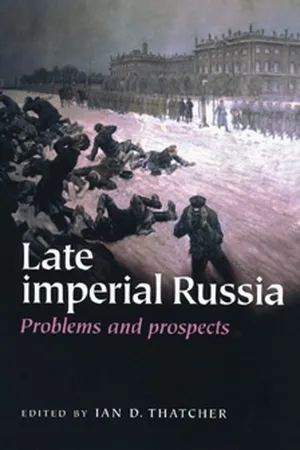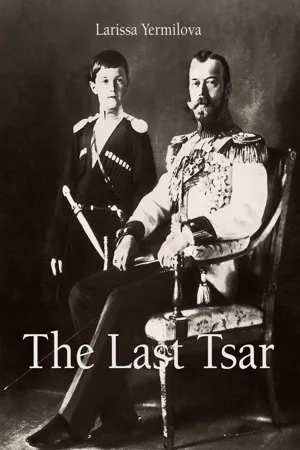History
Nicholas II
Nicholas II was the last Emperor of Russia, ruling from 1894 until his abdication in 1917. His reign was marked by political instability, social unrest, and ultimately the Russian Revolution, which led to the end of the Romanov dynasty. Nicholas II's leadership was characterized by autocratic rule and resistance to political reform, contributing to the downfall of the Russian Empire.
Written by Perlego with AI-assistance
Related key terms
1 of 5
5 Key excerpts on "Nicholas II"
- eBook - PDF
Late Imperial Russia
Problems and prospects
- Ian Thatcher(Author)
- 2024(Publication Date)
- Manchester University Press(Publisher)
The collapse of the Soviet Union left Russia seeking both precedents and alter- natives for its political future. The role and image of Nicholas II has been subject to particular revision and scrutiny. Though reviled by Soviet historians as ‘Nicholas the bloody’, post-Soviet society has harboured popular nostalgia for the Nicholaevan era. The last tsar’s public rehabilitation was symbolically con- cluded by the ceremony held on Friday 17 July 1998, when Nicholas II’s remains were interred in the Peter Paul Cathedral in St Petersburg with full state pomp and ceremony. Russia’s then premier Boris Yeltsin described the tsar and his family, who had been murdered by the Bolsheviks on 17 July 1918, as the ‘inno- cent victims’ of the revolution. 1 This description epitomises the casting of Nicholas II as a hapless bystander to Russia’s tumultuous revolution. Such an approach neglects the fundamental collision in Nicholaevan Russia between the demands of a rapidly modernising state structure and Russia’s increasingly anachronistic style of government. Nicholas II remained true to his autocratic heritage and attempted to maintain personal autocratic power, which was unre- alisable. The challenges laid down by very rapid industrial and economic change, alongside the weakness and vacillation of Nicholas II’s policies, left Nicholaevan Russia in a state of crisis. This chapter asserts that while Nicholas II failed to respond to the challenges of governing Russia, his failure can be explained by the context in which he operated as much as by his personal failings. Russia was undergoing profound social and economic change at the turn of the twentieth century. Nicholas II’s reign coincided with an intensification of the collision between political traditions that Russia’s rulers faced. - eBook - ePub
Russia in the Nineteenth Century
Autocracy, Reform, and Social Change, 1814-1914
- A. I. U. Polunov, Thomas C. Owen, L. G Zakharova(Authors)
- 2015(Publication Date)
- Routledge(Publisher)
Chapter 10Nicholas II: A Policy of Contradictions
On January 17, 1895, Nicholas II, fated to be the last emperor in Russian history, began his reign with an address to delegations from the zemstvos, towns, nobility, and Cossacks: “I know that of late, in some zemstvo assemblies, voices have been heard of people carried away by senseless dreams of the participation of representatives of the zemstvos in matters of internal administration. Let it be known to all that I, while devoting all my strength to the good of the nation, will safeguard the principle of autocracy just as firmly and steadfastly as did my late unforgettable father.”1Russia faced a historic choice in the reign of Nicholas II. Would the country follow the path of reform or revolution? Would the old order remain standing or collapse? By the turn of the twentieth century, the many contradictions that were slowly gathering in Russian life had tied themselves into a single knot, making a peaceful outcome of the crisis extremely difficult. The personal characteristics and political outlook of Nicholas II, especially his uncompromising adherence to the principle of unlimited autocracy, played a major role in causing about the eventual revolution.2As the eldest son of Alexander III, Nicholas had been destined for the throne since childhood. He received a thorough education in, among other things, foreign languages, law, economics, and military science. His teachers included the best educators of the day. However, Nicholas lacked any practical experience in government. Alexander III had counted on gradually preparing his son for the throne and for a long time gave him no governmental responsibilities. The untimely death of the Tsar-Peacemaker thrust his son to the pinnacle of power without the preparation that he needed, and from the beginning Nicholas’s inexperience had an adverse effect on the functioning of the bureaucratic apparatus. In addition to his lack of familiarity with governmental affairs, the tsar was physically unimposing—he was short and suffered from shyness. To contemporaries, Nicholas II looked like “a pathetic provincial actor playing an emperor, a role for which he was unsuited.”3 - eBook - ePub
The Emperors and Empresses of Russia
Reconsidering the Romanovs
- Donald J. Raleigh, A.A. Iskenderov(Authors)
- 2015(Publication Date)
- Routledge(Publisher)
The authors seem to suggest that no matter how sympathetic one might be to Nicholas and his plight (they are not), it is difficult to present him in anything other than a negative light. Ananich and Ganelin back the long-held view that Nicholas granted concessions only when confronted with revolution but later renounced them when the revolutionary wave had subsided and he once again had gained the upper hand. Ascending the throne without a program or policy other than the firm conviction that he must defend the autocratic order, Nicholasand his empress shared a “psychological reliance on Divine Providence.” Convinced of their divine right to rule, Nicholas and Alexandra are depicted not as tragic figures or as pawns in the historical drama, but as victims of circumstance. But to a large extent, the circumstances were of their own making.D.J.R.Note
1 Marc Ferro, Nicholas II: The Last of the Tsars (New York, 1993).Nicholas II
Boris Vasilievich Ananich
Rafail Sholomovich Ganelin
Works on Russia at the beginning of the twentieth century present Nicholas II not as a politician and thinker but rather as the last representative of a dynasty that has since left the stage of history, a man with a tragic fate, imbued with a mystic sense of doom.1The eldest son of Crown Prince Alexander Alexandrovich, who became Emperor Alexander III in 1881, and his wife Maria Fedorovna, the daughter of Danish King Christian IX (Princess Maria Sophia Frederika Dagmar prior to her marriage), Nicholas was born on 6 May 1868 at Tsarskoe Selo. On that day, a ceremonial salute was arranged in St. Petersburg and Tsarskoe Selo. By established tradition, the birth of a grand duke was celebrated by 301 shots (201 for a grand duchess). On this occasion, forty guns were fired in salute from the fortress at St. Petersburg. The grand duke was baptized on 30 May in the court chapel of the Grand Palace in Tsarskoe Selo. On that day he was awarded the Order of Andrew the First-Called (with chain), the Order of Alexander Nevsky, the Order of the White Eagle, the Order of Anna, first degree, and the Order of Stanislav, first degree. Thus, the future emperor’s military service began from the day of his birth. By Alexander II’s order he was registered in all regiments and units of the Life Guards in which his father was registered, and he was also appointed chief of the Sixty-fifth Moscow Infantry Regiment. At age seven he was promoted to second lieutenant in the Life Guards of the Preobrazhenskii Regiment. One year later, on the occasion of the 150th anniversary of the Academy of Sciences, he was elected an honorary member. - eBook - ePub
- Łarysa Jermiłowa(Author)
- 2023(Publication Date)
- Parkstone International(Publisher)
Russian field artillery ready for combat during the Russo-Japanese War of 1904-05.Nicholas II 1868 – 1918
A fter the accession to the Russian throne of 26-year old Nicholas II on May 14, 1896, there were expectations of changes in the domestic policy of the government. But these expectations were thwarted by the first speech of the young emperor made after his coronation in Moscow. He said in so many words: “Let it be known that I will safeguard the principles of autocracy as firmly and steadfastly as my unforgettable late parent did.”But it was difficult and even impossible to follow the course of Alexander III at the turn of the century. New developments were taking place on the Russian social scene, posing difficult problems for the government. The chief one was the upsurge of the revolutionary movement. By the time Nicholas II had acceded to the throne, the movement of the working class in Russia was led by the revolutionary social democrats armed with the theory of Marxism that aimed at overthrowing the autocracy.The last tsar of the Romanov dynasty had a difficult road to travel. Even people close to the court, such as ministers Witte and Durnovo, could not unravel the character of Nicholas II because he was very reserved and good mannered. At first, Witte thought that “he was a very inexperienced but not a dull young man with good manners”. Later, Witte said that the character of Nicholas II combined the traits of Paul I and Alexander I.Nicholas II (Aleksandrovich), the eldest son of Alexander III and of Empress Maria Fyodorovna, was born at Tsarskoe Selo on May 6, 1868. He received his education from his tutor, Grigory G. Danilovich. The vast programme of general and military education was spaced over 13 years. The Emperor Alexander II demanded that emphasis should be placed on teaching Russian history and literature.Emperor Nicholas II and Empress Alexandra Fyodorovna with their daughters. 1901.Tsarevich Nikolai Aleksandrovich. 1890s. - eBook - ePub
Historically Inevitable?
Turning Points of the Russian Revolution
- Tony Brenton(Author)
- 2016(Publication Date)
- Profile Books(Publisher)
4 THE LAST TSAR March 1917 DONALD CRAWFORD A T THE TURN of 1917 there was no one in Russia, or anywhere else for that matter, who could have credibly foreseen that within the year the Russian state would have disintegrated – the Romanov dynasty swept aside and its successor, the forerunner of what had appeared its future as the new socialist republic, brought down in the disorder. There was nothing in this to justify any claim to ‘historical inevitability’, but everything to remind the world that cometh chaos, there is only hindsight to explain the outcome. True, the enforced abdication of Emperor Nicholas II could be seen as inevitable, given that he had by then alienated almost the entire political establishment as well as a large part of the wider Romanov family. In the midst of a disastrous war with Japan he had survived the revolution of 1905 by reluctantly yielding to demands for an elected parliament, the Duma, albeit with ministers answerable to him. In the midst of a war with Germany he stubbornly ignored demands for a government appointed by and responsible to that same Duma. Autocracy not constitutional monarchy was to remain the model for imperial Russia. Much of the blame for his downfall could rightly be placed at the door of his interfering and dominating German-born wife, Empress Alexandra. When Nicholas took over as Supreme Commander in 1915 and removed himself to the Stavka, his front-line headquarters over 400 miles away at Mogilev, he gave his wife control of the ministers left behind in the capital Petrograd. Progressively over the next couple of years the government became her government, with ministers appointed only with the approval of her hated ‘holy man’, Grigory Rasputin. His hold over the empress stemmed from her belief that only his ‘divine spirit’ could protect the life of her haemophilic son Alexis
Index pages curate the most relevant extracts from our library of academic textbooks. They’ve been created using an in-house natural language model (NLM), each adding context and meaning to key research topics.




